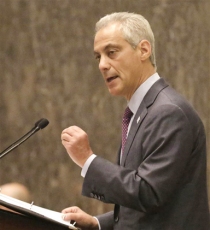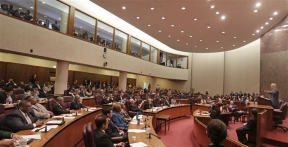
By: Ashmar Mandou
In front of 50 aldermen Tuesday, Mayor Rahm Emanuel revealed his much awaited 2016 budget proposal during a City Council meeting and asked for their support in votes. “On so many fronts, Chicago has made great progress by challenging the status quo. But as we continue to grow our economy, create jobs and attract families and business to Chicago,” said Emanuel. “With this budget, we will build on our progress in charting a new course for Chicago’s future and secure the retirements of our police and firefighters in a way that does not hurt those who can least afford it.” In his speech, Emanuel called for a phased-in property tax increase starting in 2015 through 2018; aimed to fund the City’s police and fire pension obligations. Emanuel stated that the tax would be raised by $318 million, and an additional $109 million in 2016, $53 million in 2017 and $63 million in 2018. Emanuel also mentioned homeowners’ exemption, which means any resident whose home is valued at $250,000 or less would not pay any property tax increase for police and fire pension obligations. The budget proposal also included savings and reforms:
- Substantial healthcare reforms and savings for active employees and retirees, saving $40 million
- Eliminating 150 vacant positions, saving $14 million
- Putting street sweeping on a grid, saving $3 million
- Closing Central Business District TIFs and other TIF reforms will provide $113 million to the City, CPS and other local governments, the largest in years.
- Moving to “Grid 2.0” to further enhance garbage collection efficiency, saving an additional $9.5 million

The 2016 budget will also include:
Secure the pensions for our police and firefighters by phasing in a $544 million property tax increase over the next four years while fighting for state legislation to double the state homeowners’ exemption in order to reduce the impact on working families.
Streamline building permitting, reducing wait times by 1 week while modernizing the fee structure to raise $13 million.
Assess new rideshare and taxi fees that will create $60 million in 2016 – an increase of $48 million from 2015 – the rideshare industry will be responsible for more than 80 percent of this revenue. Residents and visitors will have more transit options at our airports and McCormick Place and a portion of this revenue will support a significant expansion of wheelchair accessible taxi vehicles.








